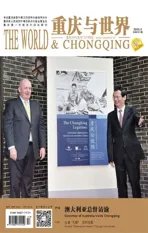重庆市国际战略研究院秘书长杨柏:重庆应放大口岸经济的竞争优势
2015-07-03曾睿
□ 文/本刊记者 曾睿
重庆市国际战略研究院秘书长杨柏:重庆应放大口岸经济的竞争优势
□ 文/本刊记者 曾睿

4月21日,中国(广东)自由贸易试验区、中国(天津)自由贸易试验区、中国(福建)自由贸易试验区同步挂牌,加上上海,我国由南到北4大自贸区“连点成线”,我国自贸区建设正式迎来全面提速的“2.0”时代。由此,也再一次引发了重庆各界对于重庆自由贸易区的热烈期待。
重庆市国际战略研究院秘书长、四川外国语大学国际商学院院长杨柏教授不久前和重庆市一些部门领导一道前往上海、广东等地进行自贸区建设和外向型经济发展考察。日前,杨柏教授接受了本刊记者专访,表示重庆拥有独特的口岸优势,应充分发展口岸经济。
重庆可打造“口岸经济”总部
众所周知,重庆目前已经拥有三大交通枢纽、三个一类开放口岸、三大保税监管区“三个三合一”的内陆开放平台,航空、铁路、水运都是国家一类口岸,目前还在瞄准东盟和南亚加速国家公路口岸的设立。杨柏说,身处内陆、“不临边不靠海”是重庆与上海、天津、广东、福建等已设立自贸区省份的最大区别,因此,重庆已有的三个“三合一”和争取中的“第四个三合一”公路口岸就是重庆设立自由贸易区的最为重要的口岸基础设施,在此基础上,重庆还需在口岸之间实现“无缝对接”,进一步提高通关效率,降低通关成本,放大重庆口岸经济的竞争优势。杨伯说,仅在现有的“三个三合一”口岸之间实现完全的互联互通,货物的口岸通关成本将降低10%左右,自由贸易区是“口岸经济”的高级别延伸,重庆在谋求设立自由贸易区的同时也应在中国西部地区率先打造成为口岸经济的总部,与上海“全球企业大区总部”的定位东西呼应。
提升“重庆制造”为“重庆智造”
杨柏还认为,重庆无论是申报自贸区还是发展外向型经济,都不能忽视重庆本地具有的雄厚的制造业基础优势,尤其是通用制造业完备的产业链条。相对于有明显“临边靠海的”的区位优势的上海、天津、广东、福建,雄厚的制造业基础应当成为未来重庆自贸区建设的一个特点。制造业尤其是在重庆有很好基础的装备制造业和通用制造业的产品交易金额大、科技含量高,在运输时间上却没有非常特殊的要求,在可以预见的时间段内,“渝新欧”与“一带一路”沿线国家对这些产品会有很大需求,重庆应该把握住这一时机,在政策上倾斜、引导重庆的制造业快速提档升级,变“重庆制造”为“重庆智造”,借未来重庆自贸区和“一带一路”国家战略的政策大环境,快速打开并巩固中亚、东盟、东欧等市场,将制造业成长为未来身处内陆的重庆自贸区的产业支撑。

“教育优势”将成为重庆自贸区核心竞争力
杨柏预测,未来重庆自贸区的建设需要大量的通晓涉外经济、法律、贸易规则的专门人才,“制造业”发展成为重庆自贸区产业支撑的过程中还需要大量的高端产业“蓝领”,更需要拥有巨大的“产业创新”能力,届时,重庆多年来秉承“经济发展、教育为先”理念,努力把重庆打造成为“西部地区教育高地”和“长江上游地区的教育中心”的“教育红利”将直观地在重庆自贸区的建设过程中体现出来,由“教育红利”变为资源优势,进而成为重庆自贸区乃至重庆对外开放和外向型经济发展的核心竞争力。
作为重庆市外经贸委与四川外国语大学联合组建、重庆对外开放和外向型经济与国际战略研究机构——重庆市国际战略研究院的负责人,杨柏认为,在未来重庆自贸区的规划建设过程中,可以充分参考国际内陆地区扩大开放、发展经济的成功经验,比如来自欧洲大陆的德国的发展经验。同时,他还建言重庆的教育机构,在进行人才培养时,应进一步加强“创新创造”意识的养成教育,“最好从人生的第一课幼儿园就开始”,“中村修二(日本诺贝尔奖获得者)就是在工厂做技术员时发明的蓝光LED,从而获得2014年度诺贝尔物理学奖。”他对记者说,在他的期望中,未来的重庆自贸区乃至未来的重庆,应该不仅仅是区域性的国际经济中心、金融中心、产业中心,还应该同时也是科教中心、创新基地和文化中心。
Three pilot free trade zones respectively in Guangdong, Tianjin and Fujian were put into operation on April 21st. Including that in Shanghai, China now has four major free trade zones scattered from south to north, which suggests an overall speedup in the development of those zones. The situation arouses another round of Chongqing’s expectation for its own free trade zone.
Professor Yang Bai, Director of Chongqing Institute for International Strategic Studies, and Dean of School of International Business in Sichuan International Studies University, together with representatives of relevant authorities in Chongqing, recently visited Shanghai and Guangdong to observe their free trade zones and export-oriented economies. Prof. Yang has spoken to our reporter in an exclusive interview, in which he says Chongqing has a distinct advantage laying in its ports, and this city should develop the port economy to full swing.
Chongqing is AbIe to BuiId a Headquarter for Port Economy

At present, Chongqing has three major transportation hubs, three first-class international ports and three bonded supervision areas, all of which form three three-in-one platforms for inland opening-up. Besides the national first-class ports of aviation, railways and waterways, it also strives to establish the highway ports with the countries of ASEAN and South Asia. As a landlocked municipality, Yang says, Chongqing’s distance from borders and coastlines is the greatest difference from the provinces, like Shanghai, Tianjin, Guangdong and Fujian,which have already set up free trade zones. As a result, the existing three three-in-one ports together with the forth threein-one highway port under deliberation are the most crucial infrastructures for building the free trade zone. On that basis, this city also needs to forge the seamless link from one port to another, which will increase the efficiency of customs clearance, reduce the cost and enlarge Chongqing’s competitive advantage in port economy. With the existing three three-in-one ports interconnected, he adds, the clearance cost can be reduced by some 10%. Given that the free trade zone is an extension at a higher level of port economy, Chongqing, while striving to set up the free trade zone, should pioneer to build the port-economical headquarter in West China, which echoes Shanghai’s position as the regional headquarters of global enterprises.
Upgrade the TraditionaI Manufacturing into a Smart One
No matter for preparing to set up the free trade zone or developing export-oriented economy, Chongqing, Mr. Yang says, should not put aside its established manufacturing, especially the mature industrial chain of general manufacturing. Compared with the cities like Shanghai, Tianjin, Guangdong and Fujian which have outstanding location near borders and coastlines, Chongqing will boast its strong manufacturing as its own characteristic of the free trade zone. Featured with large transaction amount and advanced technology, this industry, especially equipment and general manufacturing which have solid foundation in Chongqing, has no special requirement for transportation time. Therefore, it is expected that there will be huge demands for those products in the countries along the Chongqing-Xinjiang-Europe Railway and in the economical zone of “One Belt, One Road”, which represents an opportunity Chongqing should seize by the means of giving policy support and guiding a smoother industrial upgrading from the traditional manufacturing into a smart one. Relying on the free trade zone in the future and the framework of national strategy of “One Belt, One Road”, Chongqing will soon tap into the potential of markets in Central Asia and East Europe, as well as in the countries of ASEAN, and at the same time it will consolidate its current position. The manufacturing is expected to be the industrial pillar of the free trade zone in this landlocked municipality.
Education Advantage WiII become the Core Competitiveness of Chongqing’s Free Trade Zone
According to Mr. Yang’s Prediction, the building of the free trade zone in Chongqing will require numerous trained personnel in economics, law and trade rule. And the manufacturing on its way to be the economical pillar will need to employ a large number of advanced labors and, more importantly, to gain great industrial creativity. By then, the establishment of the zone will enjoy an immediate benefit brought by Chongqing’s long-term developmental concept that prioritizes the education while improving its economy and strives to shape itself as a key city of education in West China and an education center in upper stream area of Yangtze River. The education bonus will be transformed into resource advantages, which will serve as the core competitiveness for Chongqing including its free trade zone’s opening-up and development of export-oriented economy.
Jointly established by Chongqing Foreign Trade and Economic Relation Commission and Sichuan International Studies University, Chongqing Institute for International Strategic Studies is a research base focusing on issues including inland opening-up, external economy and international strategy of Chongqing. As the Director, Yang suggests that building the free trade zone may need to draw overseas experience of successful inland opening-up and the ensuing economical development, and he adds that he himself highly values the experience of Germany which is also a landlocked European country. Meanwhile, he also proposes that the educational institutions in Chongqing should highlight the fostering of students ’awareness of creativity in teaching. “It’s better to start at the very beginning of kindergarten [to foster their creativity]”, he says, “Shuji Nakamura (a 2014 Nobel laureate) invented the LED when he was a technician in a factory, and he won the Nobel Prize for Physics in 2014.” Yang tells our reporter that he hopes in the future Chongqing’s free trade zone, and even Chongqing, could become not only the regional center of international economy, finance and industries, but also a center of education, innovation and culture.
Mr. Yang Bai, Director of Chongqing Institute for International Strategic Studies Chongqing Should Highlight its Competitiveness of Port Economy
□ Written by Zeng Rui
